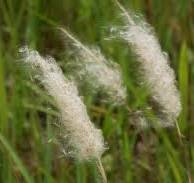Landowners in Alabama will once again be able to apply for financial assistance to mitigate one of the Southeast’s worst invasive species, cogongrass. This white, fuzzy weed has adversely affected Alabama ecosystems for more than 100 years, making it a nuisance to landowners. Soon, an application for grant funding will be launched for the third straight year.
The program application period launches February 20, 2024, at 8 a.m. Central Standard Time (CST). The online portal will remain open until March 29, 2024, at 5 p.m. CST or when a maximum of 150 applications have been received.
Known scientifically as Imperata cylindrica, cogongrass is a non-native weed species that infests pastures, forests and virtually any environment.
“Cogongrass is of concern because it displaces native plants, negatively impacts wildlife habitat, reduces productivity of pine plantations and other forests as well as pastures,” Loewenstein said. “It also creates management problems along highways as well as right-of-ways and is also a fire hazard.”
This species was once restricted to the southeastern portion of Alabama. As of this article’s publication, it is now reported in 62 of 67 counties in the state. This makes the species a threat to virtually all ecosystems because of its rapid spread and difficulty to control.
A proven solution to mitigating the spread of cogongrass is education and awareness. Being able to positively identify cogongrass is imperative. The earlier the detection, the better the management successes will be in a detected area.
“The smaller a patch of cogongrass is, the easier it is to treat. Treating infestations as soon as possible after finding them will make the job easier and improve the likelihood of success.”
The AFC will launch its third year of cost-share assistance for landowners affected by cogongrass. This financial assistance is made possible by grant funding from the Plant Protection and Quarantine program through the United States Department of Agriculture’s Animal and Plant Health Inspection Service.
The AFC said eligibility for the funding requires applicants to be nonindustrial, private landowners in any of Alabama’s 67 counties. Furthermore, there is no minimum or maximum property acreage required to apply nor does the landowner have to live on the site. The program is provided at no cost to landowners.
For more information on cogongrass cost-share assistance, contact your AFC county office. To learn more about cogongrass and its adverse affects in Alabama, search cogongrass in the search bar of Alabama Extension’s website, www.aces.edu. (Source aces)











